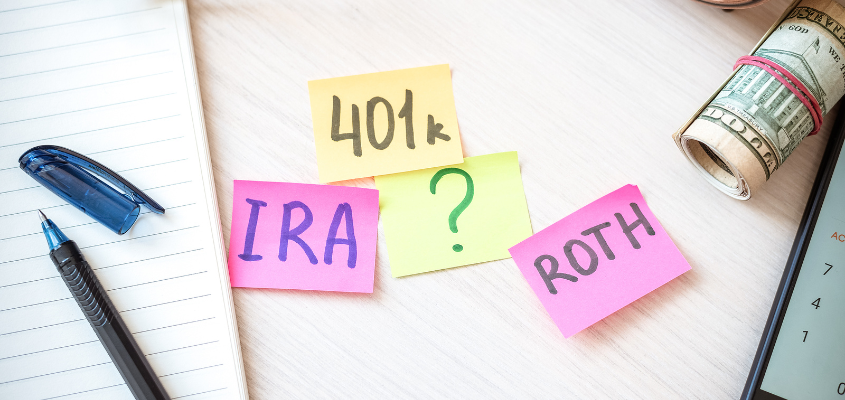
Taking a closer look at whether it might be appropriate for your situation.
Since it first became available in 2006, many employers have added the Roth 401(k) to their benefit packages as a retirement savings option. A Roth option is available for Individual Retirement Accounts (IRAs) and 401(k) and 403(b) accounts. To see if a Roth 401(k) would be appropriate for your situation, let’s take a closer look.
To Roth or Not to Roth
To start, let’s consider the advantages and disadvantages of both types of 401(k)s. With a traditional 401(k), you make contributions on a pre-tax basis, which lowers your current income subject to taxation, and earnings in the account have the potential to grow tax-deferred. However, your distributions in retirement are subject to ordinary income tax.
On the other hand, your contributions to a Roth 401(k) are made with after-tax dollars, but potential earnings and distributions are tax-free as long as you have held the account for at least five years and are at least 59½ years old. However, non-qualified distributions may be subject to income tax, and a 10% early withdrawal penalty may also apply.
So, is it better to pay taxes on your retirement funds now or later? Your most appropriate choice may depend on your current tax situation and your long-term financial goals.
It is important to keep in mind that the 401(k) annual deferral limits – $23,000 for taxpayers under age 50 and $30,500 for those age 50 or older in 2024 – apply to all 401(k) contributions, regardless of whether they are made on a pre-tax or after-tax basis. If you contribute to a Roth 401(k), you may have to reduce or discontinue contributions to your employer’s traditional 401(k) plan to avoid exceeding these limits. However, you may contribute to both types of 401(k) plans.
Under the Small Business Jobs Act of 2010, participants in traditional 401(k), 403(b), and 457(b) plans are now permitted to roll over funds into Roth accounts within their plans, if applicable. Because contributions to traditional 401(k)s are made on a pre-tax basis, any funds transferred from traditional to Roth 401(k) accounts are taxed in the year of conversion.
Here’s another point to consider. Matching contributions made by employers must be invested in a traditional 401(k), not a Roth account. So, even if you make contributions exclusively to a Roth 401(k) account, you may still owe tax on withdrawals from pre-tax funds contributed by your employer to the traditional 401(k) account.
What About the Roth IRA?
The Roth 401(k) is only available through an employer-sponsored plan, whereas the Roth IRA is available to all taxpayers (with income limitations). How do the two Roth options compare? First, you can save more money in a Roth 401(k) than in a Roth IRA. The 2024 annual contribution limits for IRAs are set at $7,000 for taxpayers under age 50 and $8,000 for those age 50 or older. On the other hand, the Roth 401(k) is subject to the more generous elective salary deferral limits that apply to conventional 401(k)s, such as $23,000 or $30,500 for those age 50 or older in 2021.
Further, the Roth IRA is subject to Modified Adjusted Gross Income (MAGI) limits; only those with MAGIs below $161,000 for single filers and $240,000 for married joint filers are eligible to contribute up to the maximum after-tax dollars to a Roth IRA in 2024. These income limits do not apply to Roth 401(k)s.
In addition, contributions to a Roth 401(k) can be made through payroll deductions, which can put retirement savings on autopilot. To participate, an employee who is currently contributing to a traditional 401(k) plan could, for example, opt to have his or her contributions diverted to a Roth version of the same plan.
If you are interested in contributing to a Roth 401(k), ask your company’s benefit administrator if this option is available for your retirement plan. If not, expressing interest in the Roth 401 (k) may prompt your employer to adopt the option.
Considering whether to choose a Roth 401(k) or traditional 401(k) can significantly impact your long-term retirement strategy. Understanding the nuances between these options is crucial in making an informed decision that aligns with your financial goals and current tax situation.
If you're unsure which option suits you best, Dominion Wealth Management is here to help. Contact our offices today to schedule an appointment with one of our experienced advisors. We can assess your unique circumstances and provide personalized guidance to optimize your retirement savings. Your future financial security starts with a conversation—reach out to us now and take the next step towards a more secure retirement.
Source: Copyright © 2024 FMeX. All rights reserved. Distributed by Financial Media Exchange


Comentários